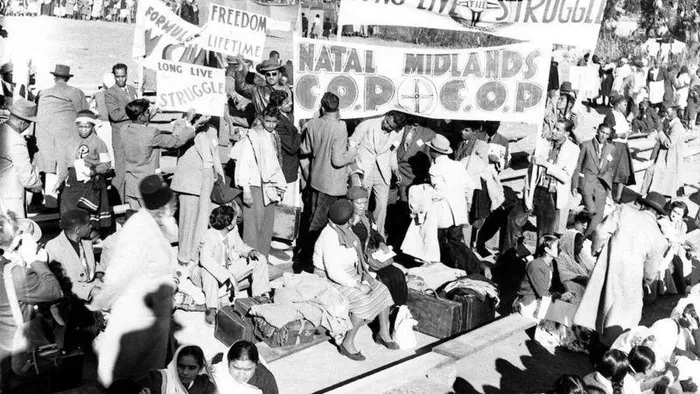South Africa reflects on 70 Years since the Freedom Charter was born
Historic Congress

Delegates from Natal at Kliptown for the signing of the Freedom Charter. A landmark in the struggle against apartheid, the Charter was drawn up and endorsed by thousands of South Africans during the historic Congress of the People in Kliptown, Soweto in 1955.
Image: Supplied
This week marks a significant milestone in South Africa’s democratic journey as the nation commemorates the seventieth anniversary of the adoption of the Freedom Charter.
A landmark in the struggle against apartheid, the Charter was drawn up and endorsed by thousands of South Africans during the historic Congress of the People in Kliptown, Soweto in 1955.
To honour this momentous occasion, a national dialogue is taking place at Freedom Park in Pretoria.
Hosted by the government and attended by youth leaders, civil society organisations and representatives from democratic institutions, the event is unfolding under the theme “From Charter to Constitution, Bridging Generations.”
It is both a celebration and a moment of reflection. Seventy years ago, roughly three thousand delegates gathered in a dusty field under the watchful eye of the apartheid state. They were members of the Congress Alliance, a coalition that included the African National Congress, the South African Indian Congress, the Coloured People's Congress, and the South African Congress of Democrats, among others.
Together, they drafted a vision of a future South Africa that would belong to all who lived in it, united in their diversity.
That phrase — “South Africa belongs to all who live in it” — became a cornerstone of the Freedom Charter and remains a guiding principle of the democratic Constitution that would follow decades later. Today, those words are etched into the national consciousness and enshrined in the Bill of Rights.
At Freedom Park, the atmosphere is both solemn and hopeful. Young people, some born long after the end of apartheid, are engaging in robust discussions with members of Parliament, the judiciary, and Chapter Nine institutions such as the South African Human Rights Commission and the Public Protector’s Office.
Their task is to grapple with a question that has grown more complex over time: Does the vision of the Freedom Charter still resonate in modern South Africa?
While the nation has made undeniable strides in securing political freedom, the discussions have highlighted that social and economic justice remain elusive for many. Issues such as youth unemployment, inequality and service delivery gaps have taken centre stage. Some participants argue that while the Charter laid the foundation for equality, the work of building a just society is far from over.
One student leader from Limpopo expressed cautious optimism. “We stand on the shoulders of giants. Our generation must carry the torch forward. But we need more than commemoration. We need commitment to real change.”
The dialogue has been framed not as a one-off event but as part of a broader national effort to renew South Africa’s democratic ideals and build intergenerational understanding. As the country faces modern challenges, it continues to look back at the Freedom Charter not only as a symbol of resistance but as a blueprint for a better future.
Seventy years on, the spirit of Kliptown still echoes — not just in speeches and ceremonies, but in the determination of those who dare to dream of a more equal and united South Africa.